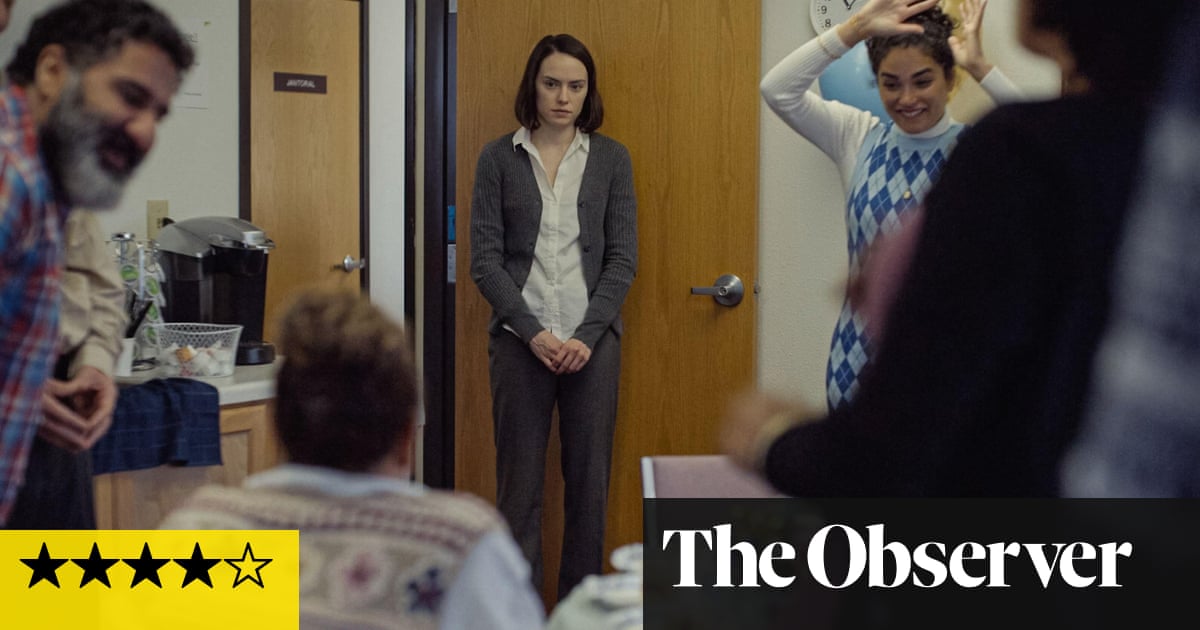Some people settle effortlessly into the business of living. Others find it a near-impossible challenge. Fran (a revelatory performance from Daisy Ridley) falls into the latter camp. A painfully introverted thirtysomething office worker, Fran has barricaded herself behind a rigid routine that minimises the risk of social interaction, both at work and after it. It’s not that she’s antisocial exactly, just that she has never quite grasped the rules of small talk, the ebb and flow of polite conversation. The amiable murmur of office banter might as well be playing out in Mandarin Chinese for all she comprehends of it.
It’s far easier for Fran to sink into her rich, if somewhat morbid interior life. Sporadically during the working day, a lush, romantic swell of harps and strings rises like a tidal surge on the score, drowning out the tinkling office chatter. And Fran treats herself to a moment of revery. She drifts away in her imagination, to a deserted forest glade or a beach – each location empty but for her own dead body. She isn’t suicidal – not actively, at least – but there’s something about death that appeals to her: the quiet of it, the simplicity. The fact that nobody is likely to ruin her day by asking her whether she would like a biscuit with her coffee.
This angular, acutely perceptive little film is a comedy in the most melancholy of minor keys. It’s as much about the silences and fumbled responses that come slightly too late to be of any conversational use as it is about what is actually said. And it showcases Ridley, the British actor best known for the recurring role of Rey in the Star Wars series, as a fascinating, unexpectedly offbeat talent. Not only does she disappear into the role; she unwraps the odd, idiosyncratic soul of her character largely without dialogue. US director Rachel Lambert points our gaze towards Fran’s nervous tics and tells, her bitten lip and the anxious dance of her feet under the desk. It’s a good 20 minutes into the film before Fran speaks, and when she does, her muttered sentence sounds as painful as a dental extraction.
We follow Fran, with her barbed-wire frown and almost aggressively inconspicuous wardrobe, as she scuttles through the ritual of her identical days. She tunes out her pleasantly unremarkable colleagues and immerses herself in the familiar safety of her spreadsheets; at home, she microwaves an unappetising brown disc of some sort of protein and eats it, topped with cottage cheese, in silence.
Just once, the outside world encroaches on her space. She is asked to contribute a message for a retiring colleague’s leaving card. In quiet consternation, intimidated by the easy camaraderie in the notes scrawled by her co-workers, she chews over the task, scrolling through her memories of the nondescript Carol. She settles for a small, restrained sentiment written in her small, restrained handwriting: “Happy Retirement, Fran.”
Then a new guy joins her workplace. Robert (Dave Merheje) pings her chatty messages over the office virtual message board. Inadvertently, Fran makes him laugh. He invites her to the cinema. New windows of social possibility start to open; windows that self-sabotaging Fran busily bricks shut, even as she finds herself increasingly drawn to the view.
It’s a step up in terms of profile for Lambert, a former theatre costume designer turned writer and director whose 2016 drama In the Radiant City made ripples on the festival circuit. Her intimate, frequently female-led storytelling has something of the crystalline delicacy and understated humour of Kelly Reichardt’s work. The film makes the most of the doleful beauty of its Pacific north-west location (it’s mainly shot in the city of Astoria, Oregon). It’s a midway place, caught between past and present, the heavy, looming bulk of industry and the wild, untamed natural world; between inertia and possibility. It’s a setting that neatly reflects Fran’s quandary, torn between self-imposed isolation and a newfound hankering for connection.
While the time period isn’t specified, Sometimes I Think About Dying was shot during the height of the pandemic – a reality that, although not overtly addressed in the story, has seeped into every frame. It’s a Covid movie without Covid, an eloquent account of the unlearned social skills and sense of pandemic-enforced disengagement. It plays out at the tipping point at which living with loneliness starts to feel easier than tackling the daunting prospect of conversation with a stranger.
after newsletter promotion







